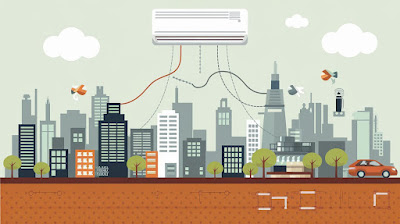Air quality in urban environments has become a growing concern, especially with the increase in pollution and population density. Proper air conditioning has emerged as an effective solution to improve indoor air quality, providing healthier and more comfortable environments for city dwellers and workers. Understanding how these systems can contribute to air purification and people's well-being is essential to promoting a healthier urban lifestyle.
1. The importance of air filters in air conditioning systems:
One of the main components of air conditioning systems that contribute to improving air quality are air filters. They are responsible for capturing dust particles, allergens, bacteria and other pollutants that may be present in the air. The use of high-efficiency filters, such as HEPA (High-Efficiency Particulate Air) filters, is essential to ensure that harmful particles are removed, reducing the risk of respiratory problems and allergies. Furthermore, regular maintenance and replacement of these filters are essential for them to continue to function effectively.
2. Humidity control and adequate ventilation:
In addition to air filtration, humidity control and ventilation are crucial aspects of air conditioning to improve air quality. Environments with excessive humidity can encourage the proliferation of mold and dust mites, while low humidity can cause respiratory discomfort and dry skin. Air conditioning systems that incorporate dehumidifiers and humidifiers help maintain optimal humidity levels. Adequate ventilation is also vital, as it allows air exchange, bringing in fresh air from outside and removing stale air full of pollutants and carbon dioxide from the environment.
3. Use of air purification technologies:
Technological innovations have allowed the development of air conditioning systems that not only control temperature and humidity, but also actively purify the air. Technologies such as ionizers, which emit negative ions to neutralize harmful particles, and ultraviolet (UV) radiation purification systems, which eliminate viruses and bacteria, are increasingly being integrated into modern HVAC systems. These technologies provide an additional layer of protection, ensuring cleaner, healthier indoor air.
Proper HVAC plays a key role in improving air quality in urban environments, contributing to people’s health and well-being. Through efficient filters, humidity control, adequate ventilation and advanced purification technologies, it is possible to create healthier, pollutant-free indoor environments. As cities continue to grow, the implementation of effective HVAC systems and awareness of the importance of air quality become increasingly essential for a sustainable and healthy urban future.
